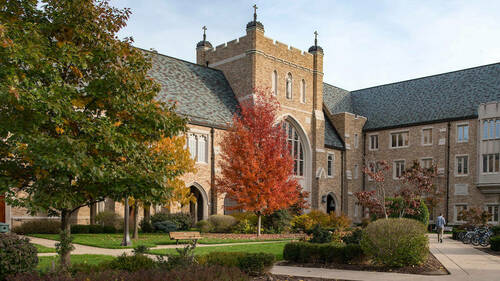
Notre Dame Law School’s Religious Liberty Initiative has filed three amicus briefs, including one at the U.S. Supreme Court, representing Muslim organizations and scholars in defense of Jewish groups that have been shut down by discriminatory COVID-19 closures in New York City.
The first brief was filed Oct. 22 in New York federal court in support of an Orthodox Jewish girl’s school. The second brief was filed Oct. 26 in the U.S. Court of Appeals for the Second Circuit in support of Orthodox Jewish synagogues. The Religious Liberty Initiative filed a third brief in the U.S. Supreme Court on Nov. 17 also in support of Orthodox Jewish synagogues.
The amicus briefs provide historical context for ways in which the government has scapegoated religious minorities during times of uncertainty or crisis. They caution that New York is following that troubling pattern with its recent COVID-19 policies explicitly singling out Orthodox Jewish neighborhoods for disfavored treatment.
“The filing of these briefs marks a significant milestone in the development of our emerging Religious Liberty Initiative,” said Stephanie Barclay, associate professor of law and a First Amendment scholar who is helping launch the Law School’s Religious Liberty Initiative.
The Religious Liberty Initiative’s first student cohort consists of Alyson Cox, Alexandra Howell, Daniel Judge, Dan Loesing and Hadyn Pettersen.
“I’m proud of the impressive work our students have done as part of the Religious Liberty Initiative,” Barclay said. “These recent briefs involved a Catholic institution representing Muslim organizations defending Orthodox Jewish plaintiffs. This type of work highlights the best of our religious liberty traditions, where people of different faiths are willing to advocate for each other.”
The amicus briefs represented the views of the Muslim Public Affairs Council, the Religious Freedom Institute’s Islam and Religious Freedom Action Team, and law and religion scholar Asma Uddin. The brief points out that “too often, religious minorities have served as scapegoats in times of sickness, war, and fear — from Jews during the Black Death, to Jehovah’s Witnesses during WWII, to Muslims after 9/11. Latest in a long and troubling line of such incidents are the statements and policies of Governor [Andrew] Cuomo blaming Orthodox Jewish communities for the spread of COVID-19 ... , all despite a dearth of evidence.”
Ismail Royer, director of the Islam and Religious Freedom Action Team for the Religious Freedom Institute, said, “We are profoundly grateful to the Notre Dame Religious Liberty Initiative for working with us on this amicus brief. Professor Barclay and her students had a deep intuition for the arguments we wanted to make before the court. A Muslim voice would not have been heard in this case without them.”
Third-year law student Daniel Judge said, “One of the important points made in the amicus brief is that there is a long and unfortunate history of unjustly targeting religious minorities during times of crisis. I’m proud to have worked on a brief that defends all religions and provides a voice for minority communities. The Religious Liberty Initiative has been one of my best experiences in law school. It has given me the opportunity to work on real cases in an area I hope to practice in throughout my career.”
Cuomo has argued that his blunt policy, targeting Jewish neighborhoods more than other COVID-19 hot spots, is necessary to help “the anxiety come down.” But the briefs all point out that the “First Amendment does not sanction religious bigotry as a form of anxiety management.”
Third-year law student Alexandra Howell said, “Being part of the Religious Liberty Initiative has helped me realize that I am in law school not to just be a student, but to learn how to be a lawyer that can make a positive difference. It is a powerful reminder of God's calling for my life and all the opportunities for service in the law.”
In addition, Howell adds that she is very proud to be involved in helping make the statement that no matter the crisis, the First Amendment does not allow governments to use religious minorities as a scapegoat.
Third-year law student Alyson Cox agrees. “This amicus brief is a beautiful representation of inter-religious solidarity in the face of persecution. The chance to work on this case was one of the most meaningful parts of my law school experience, and I am so grateful for the opportunity to be part of the Religious Liberty Initiative,” Cox said.
Second-year law student Daniel Loesing said, “I am delighted to be a part of the Religious Liberty Initiative at Notre Dame Law School, and I look forward to continuing to defend religious liberty for all, in service of God, Our Lady and our fellow citizens.”
The Law School announced early this year the formation of a Religious Liberty Clinic that will train future Notre Dame lawyers to defend religious freedom by pursuing claims in trial courts as well as appeals up to and including the U.S. Supreme Court.